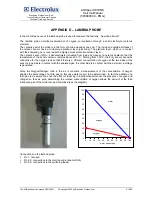
Electrolux Professional S.p.A.
Ovens Platform Customer Support
Technical Training & Service
AOSpeed OVENS
Service Manual
(593800300 - ENG)
File: AOSpeed service manual (ENG).001
©Copyright 2002 by Electrolux Professional
P.19/20
APPENDIX D – LAMBDA PROBE
In the Air-O-Speed ovens the lambda probe is used to measure the humidity. How does it work?
The lambda probe permits measurement of oxygen concentration through a solid electrolyte (ceramic
element)
The ceramic part of the probe is in the form of a tube closed at one end. The inside and outside surfaces of
the ceramic sensor have a microporous platinum layer (electrode). The platinum layer, which is in contact
with the analyzed gas, is covered with a highly porous protective ceramic layer.
The ceramic sensor (ZrO
2
– solid electrolyte) is heated from inside by means of a ceramic heater so that the
temperature of the sensor ceramic remains above 350 °C. Starting from 300°C, the ZrO
2
sensor becomes
conductive for the oxygen ions so that if there is a different concentration of oxygen at the two sides of the
sensors (one side is in contact with the analyzed gas, the other side is in contact with the external), a voltage
is generated.
Since the Oxygen/Nitrogen ratio in the air is constant, a measurement of the concentration of oxygen
enables the percentage of a third gas (in this case water vapor) to be determined. In fact the addition of a
third gas to a sample of air has the effect of reducing in a proportional manner the presence of oxygen and
nitrogen so that, as said, determining the relative concentration of oxygen allows the amount of the third
introduced gas of the mixture to be determined (see the diagram).
Connections on the lambda probe:
Pin 1: not used
Pin 2-3: connections to the main board (connector X23)
Pin 4-5: connections to the switching feeder
0
10
20
30
40
50
60
70
80
90
100
0
10
20
30
40
50
60
70
80
90
100
water percentage
oxygen
nitrogen
water


































